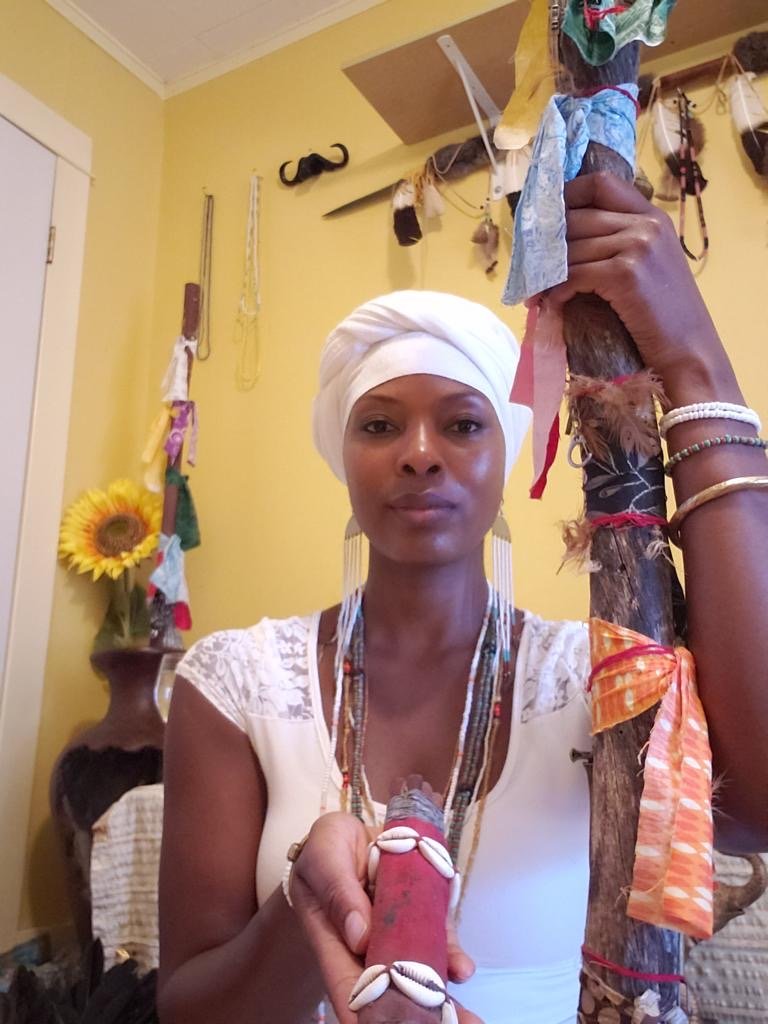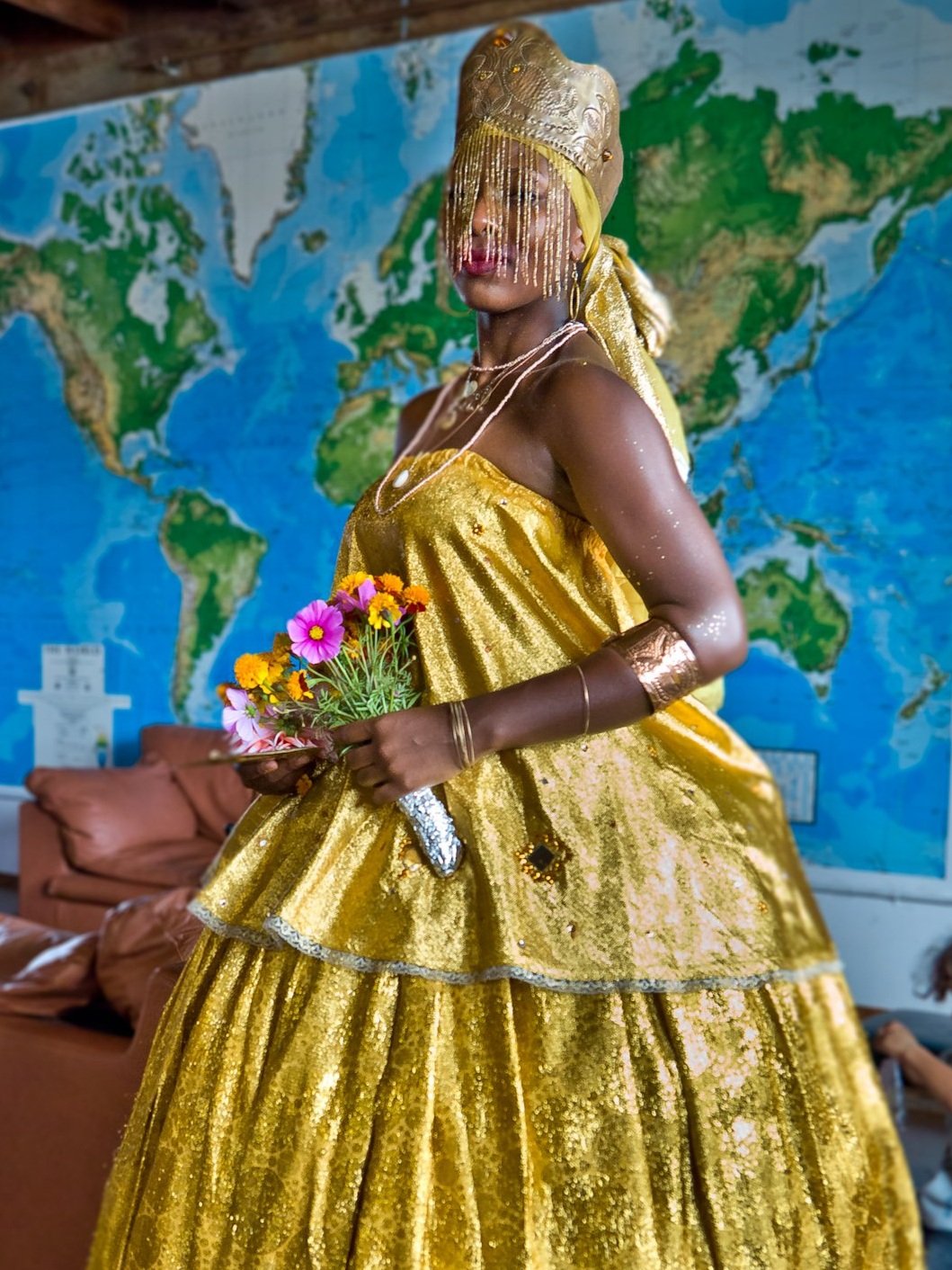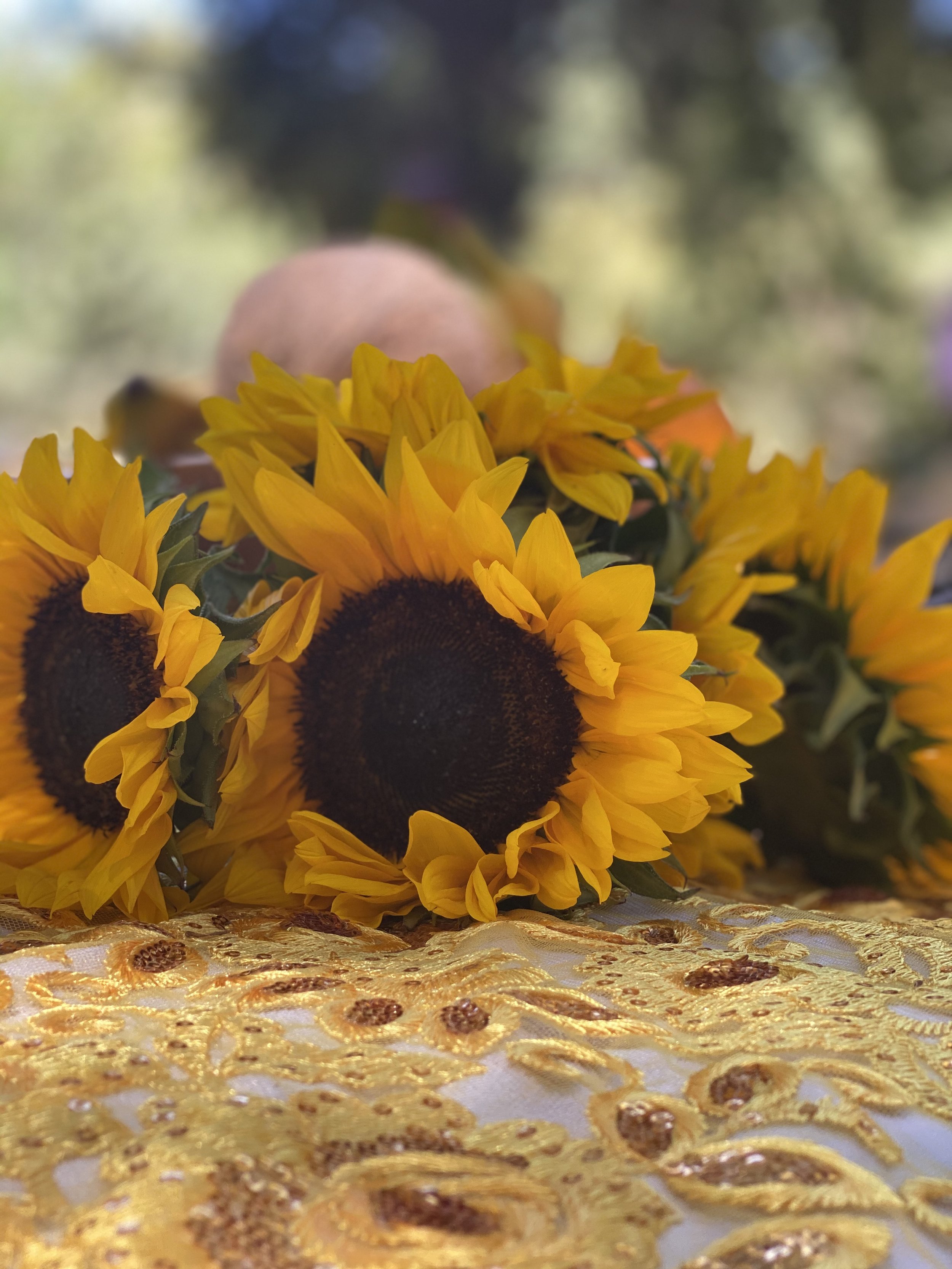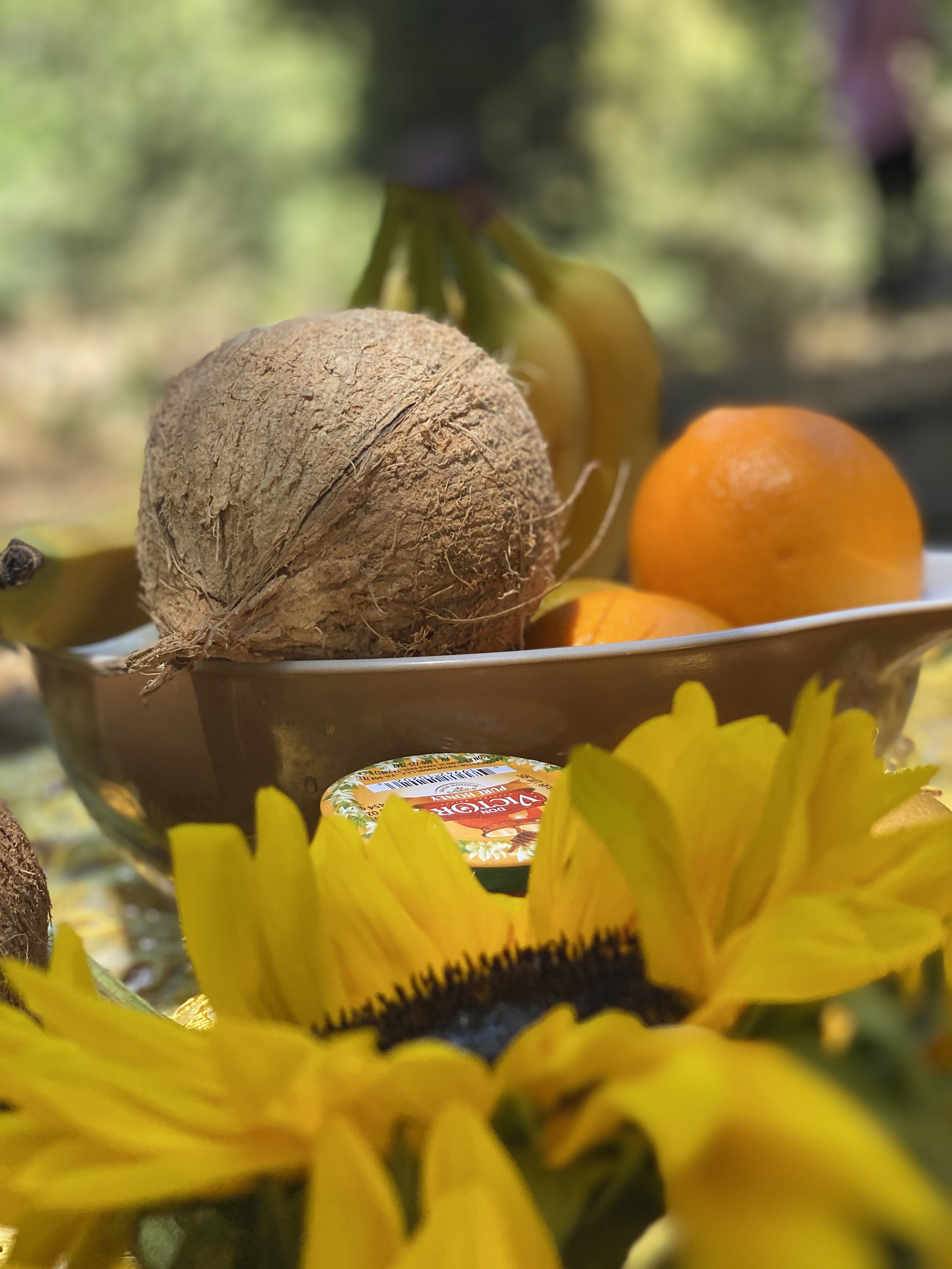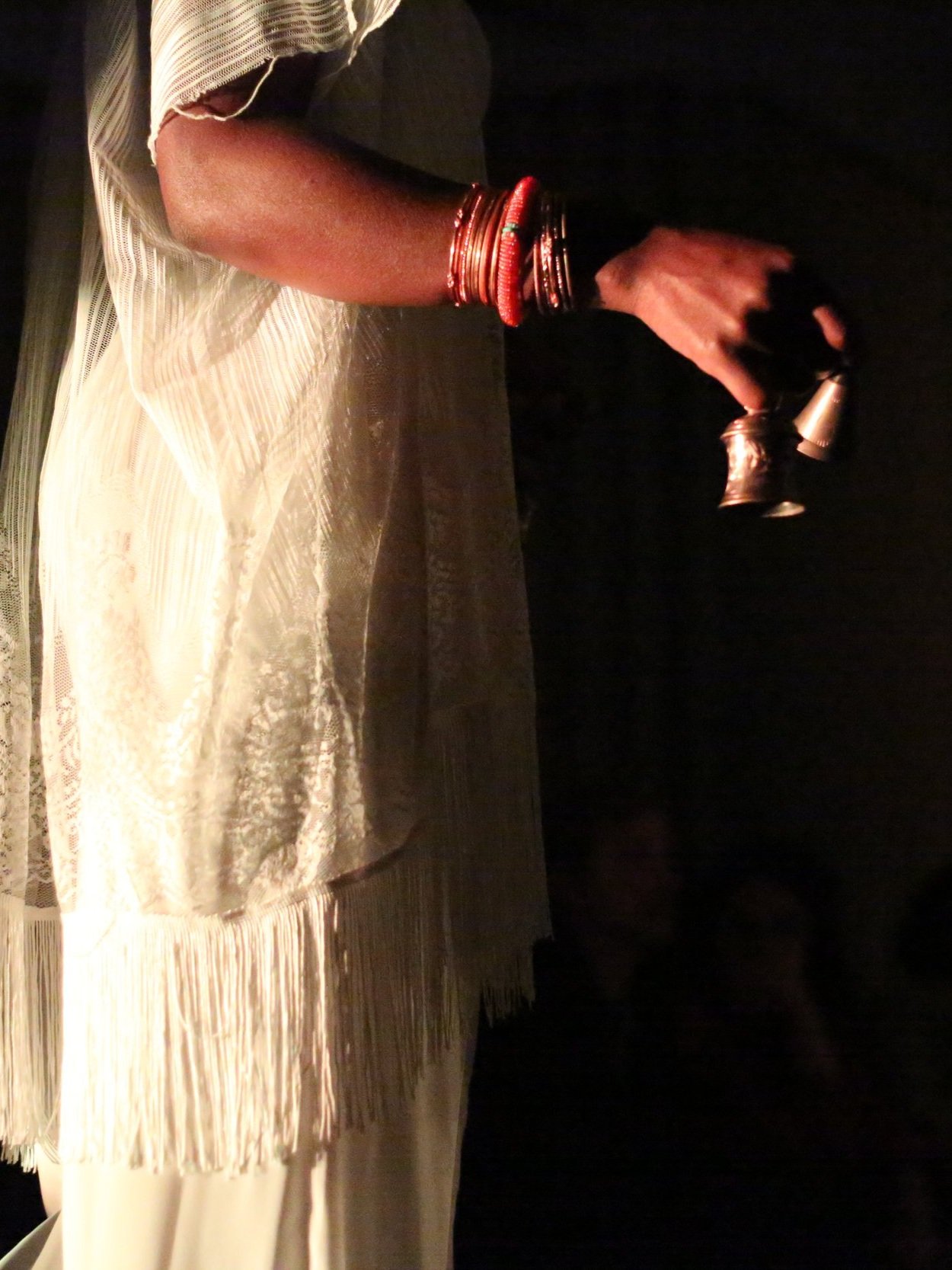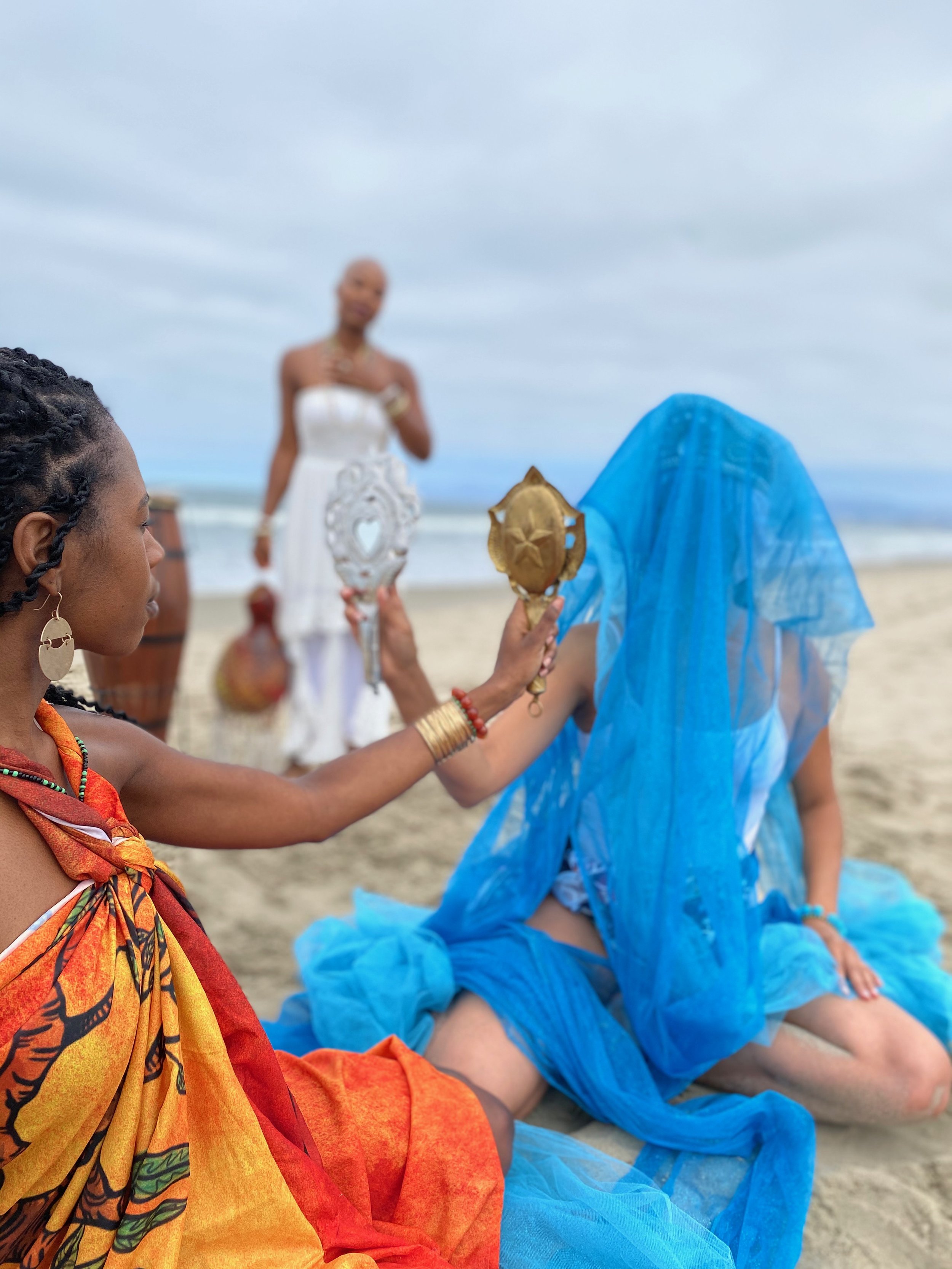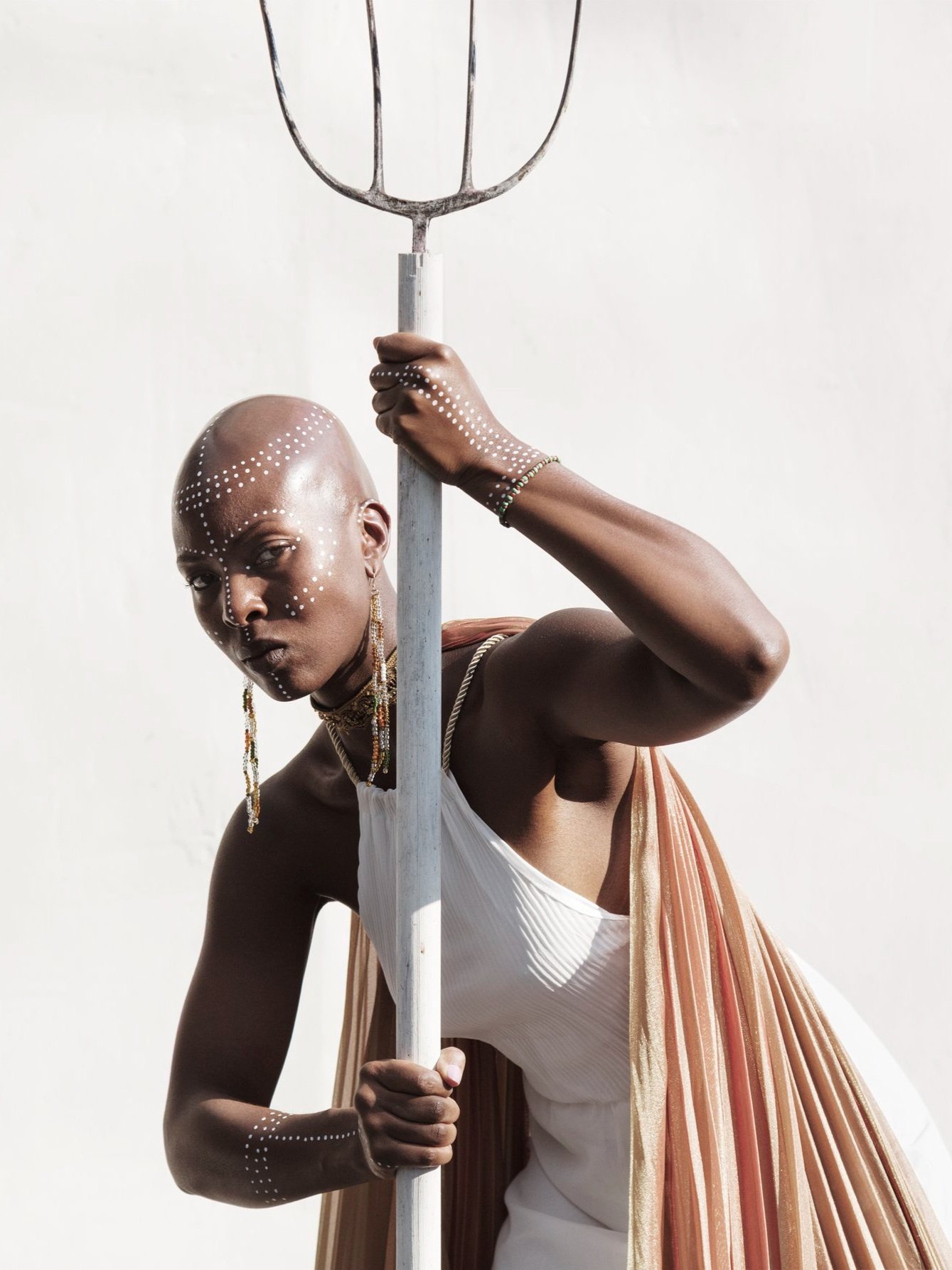
Reflections & Credits
-
A prayer of gratitude, appreciation, honor, and reverence to Egun/Eegun (Ancestors in the Yorùbá language) over singing bowls, bells, sticks, shakers.
More about this and similar tracks (3, 5, 7)
In considering the pieces that would flow between the other songs, I wanted sounds that could connect everything together and give the feel of a prayer, meditation, or dedication. And it came to me to incorporate metal singing bowls, bells, and other instrumentation to create rich mini sound bath experiences.
I was introduced to singing bowls only a few years ago; and yet every time I play them, as they resonate within my hands, they strike chords throughout my entire being that inspire a sense of familiarity. And while in real-time and for events I usually sing over them, pairing them with the spoken voice for this album felt more appropriate. In fact, the words I spoke came well after the instrumentation was tracked, and was recorded separately without the music as a reference. It all melded together so wonderfully and synchronistically.
The interplay between my words and the instrumentation is such a beautiful dance of structure and chaos; warmth and coolness; moving inward yet expanding outward. It is the ultimate balance.
I debated as to whether I should refer to these tracks as interludes given their length. And though they serve a similar purpose as interludes would and also provide support for the subsequent tracks, they are their own entities, have their own energy, and support specific healing. They are also crucial in sealing in the intention of this work: to soothe the soul.
Track Credits
ONYI LOVE: Vocals, Singing Bowls, Bells, Sticks, Shakers
Arranged, Composed, Produced by ONYI LOVE
Prayer Written by ONYI LOVE
Recorded, Mixed, Co-Produced by Bobby Easton at Fuzzy Sound Lab
Mastered by Nic Chaffee at Woodshed Music
-
The first half of this multifaceted song for Eṣu has a cosmic, ethereal, otherworldly feel, which speaks to the multiple dimensionality of this energy. It was important to allow this track to stand on its own as complete energy.
More about this track and its counterparts (The End & Complete)
This song holds many firsts for me. From present moving through past: it is the first born of the songs on this album; it was the first arrangement/composition I did when I first began experimenting with Pro-Tools in 2007; Eṣu is one of [if not the] first Oriṣa I learned about in my Afro-Latin Percussion Instruments class in 2003. Learning about this energy was the first time I stepped into a new level of awareness about the pervasive attempted erasure, demonization, and appropriation of African traditions and cultures by others due to purposeful manipulation, ignorant entitlement, savior complexes, or all of the above and more.
For me the juxtaposition of (the presence of this song and the space I have given it on my album, and all of its beautiful and varying elements) + (the still present colonial-influenced beliefs about Eṣu) = one way of breaking through what is neither mine nor my ancestors’. My work in general and through this song helps me to return to and remember our healed state. I love this song. I love Eṣu. And I am grateful for the various paths he has helped me open and close.
This song is my arrangement of a series of Afro-Cuban Oricha songs for Eṣu. I maintained all aspects of the lyrics as I had learned and recalled them. I took some liberties with the vocal melodies and more so with harmonies in order to fit them into the musical composition. I alternate between and at times overlap traditional and non-traditional instrumentation and rhythms for these songs. Recorded as one track, this song contained a natural break almost right in the middle with both parts being able to stand on their own. I honored this multi-dimensionality allow it to exist as 3 expressions: The Beginning, The End, and Complete. And it just so happens that one of Eṣu’s numbers is 3.
Track Credits
ONYI LOVE: Vocals, Piano, Shekere, Agogo (Cowbell)
Lazaro Galarraga: Bata
Bobby Wilmore: Bata
Greg Allison: Violin, Viola
JP Maramba: Upright Bass
Simon Carroll: Snare drum
Tristan de Liège: String Co-Arrangement
Arranged, Composed, Produced by ONYI LOVE
Recorded, Mixed, Co-Produced by Bobby Easton at Fuzzy Sound Lab
Mastered by Nic Chaffee at Woodshed Music
-
A reflection about my connection and relationship with Ogun, the Orisa (deity within the Yorùbá traditional system) over singing bowls, bells, sticks, shakers.
More about this and similar tracks (1, 5, 7)
In considering the pieces that would flow between the other songs, I wanted sounds that could connect everything together and give the feel of a prayer, meditation, or dedication. And it came to me to incorporate metal singing bowls, bells, and other instrumentation to create rich mini sound bath experiences.
I was introduced to singing bowls only a few years ago; and yet every time I play them, as they resonate within my hands, they strike chords throughout my entire being that inspire a sense of familiarity. And while in real-time and for events I usually sing over them, pairing them with the spoken voice for this album felt more appropriate. In fact, the words I spoke came well after the instrumentation was tracked, and was recorded separately without the music as a reference. It all melded together so wonderfully and synchronistically.
The interplay between my words and the instrumentation is such a beautiful dance of structure and chaos; warmth and coolness; moving inward yet expanding outward. It is the ultimate balance.
I debated as to whether I should refer to these tracks as interludes given their length. And though they serve a similar purpose as interludes would and also provide support for the subsequent tracks, they are their own entities, have their own energy, and support specific healing. They are also crucial in sealing in the intention of this work: to soothe the soul.
Track Credits
ONYI LOVE: Vocals, Singing Bowls, Bells, Sticks, Shakers
Arranged, Composed, Produced by ONYI LOVE
Reflection Written by ONYI LOVE
Recorded, Mixed, Co-Produced by Bobby Easton at Fuzzy Sound Lab
Mastered by Nic Chaffee at Woodshed Music
-
When considering a deity that is often, rather mostly, associated with fighting or war, most people wouldn’t necessarily think of affection or love. But that is what I feel for Ogun.
Perhaps it is because of the breakthrough I have experience with his assistance. Or maybe it is because he reminds me of my connection to other human beings and myself, and of the importance of the balance between solitude and companionship.
Better yet, perhaps it is because he teaches and brings me peace and shows me various ways for tapping into my creativity…all such crucial elements in my life. He has also helped me to breakthrough the things I had cosigned and created that prevented me from being in my full joy. He, like the other Oriṣa and Irunmole are not one dimensional; they are so multi-faceted and complex, helping us to return to our state of balance in all the ways that are necessary.
And just maybe, what I feel is the energy of Samuel Ogunbona Oduntan, my maternal great grandfather. Names are no accident nor given frivolously in Yoruba culture, especially the further back one goes. So perhaps I feel him and his love every time I think of, sit with, dance and sing for Ogun. That’s such a beautiful thought.
This song is my arrangement of a series of Afro-Cuban Oricha songs for Ogun. I maintained all aspects of the lyrics as I had learned and recalled them. I took some liberties with the vocal melodies and more so with harmonies in order to fit them into the musical composition. I utilize instrumentation and rhythms that are not traditional for these songs.
Track Credits
ONYI LOVE: Vocals, Congas, Vibraphone, Block
JP Maramba: Upright Bass
Bobby Easton: Steel Pan, Shakers
Arranged, Composed, Produced by ONYI LOVE
Recorded, Mixed, Co-Produced by Bobby Easton at Fuzzy Sound Lab
Mastered by Nic Chaffee at Woodshed Music
-
A telling of story behind the inspiration and arrangement for Yemaya Ase’sun Lullaby for Sōl over singing bowls, bells, sticks, shakers.
More about this and similar tracks (1, 3, 7)
In considering the pieces that would flow between the other songs, I wanted sounds that could connect everything together and give the feel of a prayer, meditation, or dedication. And it came to me to incorporate metal singing bowls, bells, and other instrumentation to create rich mini sound bath experiences.
I was introduced to singing bowls only a few years ago; and yet every time I play them, as they resonate within my hands, they strike chords throughout my entire being that inspire a sense of familiarity. And while in real-time and for events I usually sing over them, pairing them with the spoken voice for this album felt more appropriate. In fact, the words I spoke came well after the instrumentation was tracked, and was recorded separately without the music as a reference. It all melded together so wonderfully and synchronistically.
The interplay between my words and the instrumentation is such a beautiful dance of structure and chaos; warmth and coolness; moving inward yet expanding outward. It is the ultimate balance.
I debated as to whether I should refer to these tracks as interludes given their length. And though they serve a similar purpose as interludes would and also provide support for the subsequent tracks, they are their own entities, have their own energy, and support specific healing. They are also crucial in sealing in the intention of this work: to soothe the soul.
Track Credits
ONYI LOVE: Vocals, Singing Bowls, Bells, Sticks, Shakers
Arranged, Composed, Produced by ONYI LOVE
Reflection Written by ONYI LOVE
Recorded, Mixed, Co-Produced by Bobby Easton at Fuzzy Sound Lab
Mastered by Nic Chaffee at Woodshed Music
-
Yemaya is the Lukumi name of the Oriṣa referred to as Yemoja in Yorubaland. Yeye (mother) |ọmọ (children) | eja (fish): Mother whose children are [like/as many as the] fish. She deals with nurturing, discipline, protection, and so much more, especially as it pertains to motherhood.
This song is my arrangement of an Afro-Cuban Oricha song for Yemaya. I maintained all aspects of the lyrics of the song as I had learned and recalled it. I took some liberties with harmonies in order to fit the musical composition and utilized non-tradition instrumentation. Given the maternal energy of Yemaya/Yemoja, and a specific encounter I had (which I share in Yemaya Ase’sun Sōl Inspiration), I wanted to give this arrangement a lullaby feel.
I included Okun (the ocean) and kept its energy throughout the song in part to honor the Cuban perspective of Yemaya, who is associated with the ocean, whereas traditionally in Nigeria, Yemoja is a river deity. It is interesting to consider how and why the various in association with specific bodies of water occurred—a general consensus being that the Trans-Atlantic Slave trade played a major role. I continue to learn. As someone of Yoruba descent actively working on reconnecting to my tribe in deeper ways, understanding the root is very important for me. And as a person connected to other branches of the African Diaspora, I work to know the various threads and do my part to weave them together so that we can come together and heal. I pray your soul is engulfed in the energy of this song in ways it needs in order to be soothed.
Track Credits
ONYI LOVE: Vocals, Rhodes Piano, Shaker
Bobby Easton: Electric Bass, Guitar
-
A description about my relationship with and some of the characteristics of Eṣu, the Oriṣa (deity within the Yorùbá traditional system) over singing bowls, bells, sticks, shakers.
More about this and similar tracks (1, 3, 5)
In considering the pieces that would flow between the other songs, I wanted sounds that could connect everything together and give the feel of a prayer, meditation, or dedication. And it came to me to incorporate metal singing bowls, bells, and other instrumentation to create rich mini sound bath experiences.
I was introduced to singing bowls only a few years ago; and yet every time I play them, as they resonate within my hands, they strike chords throughout my entire being that inspire a sense of familiarity. And while in real-time and for events I usually sing over them, pairing them with the spoken voice for this album felt more appropriate. In fact, the words I spoke came well after the instrumentation was tracked, and was recorded separately without the music as a reference. It all melded together so wonderfully and synchronistically.
The interplay between my words and the instrumentation is such a beautiful dance of structure and chaos; warmth and coolness; moving inward yet expanding outward. It is the ultimate balance.
I debated as to whether I should refer to these tracks as interludes given their length. And though they serve a similar purpose as interludes would and also provide support for the subsequent tracks, they are their own entities, have their own energy, and support specific healing. They are also crucial in sealing in the intention of this work: to soothe the soul.
Track Credits
ONYI LOVE: Vocals, Singing Bowls, Bells, Sticks, Shakers
Arranged, Composed, Produced by ONYI LOVE
Reflection Written by ONYI LOVE
Recorded, Mixed, Co-Produced by Bobby Easton at Fuzzy Sound Lab
Mastered by Nic Chaffee at Woodshed Music
-
The second half of this multidimensional song for Eṣu has a more playful, childlike, trickster feel, which speaks to the multiple dimensionality of this energy. It was important to allow this track to stand on its own as complete energy.
More about this track and its counterparts (The Beginning & Complete)
This song holds many firsts for me. From present moving through past: it is the first born of the songs on this album; it was the first arrangement/composition I did when I first began experimenting with Pro-Tools in 2007; Eṣu is one of [if not the] first Oriṣa I learned about in my Afro-Latin Percussion Instruments class in 2003. Learning about this energy was the first time I stepped into a new level of awareness about the pervasive attempted erasure, demonization, and appropriation of African traditions and cultures by others due to purposeful manipulation, ignorant entitlement, savior complexes, or all of the above and more.
For me the juxtaposition of (the presence of this song and the space I have given it on my album, and all of its beautiful and varying elements) + (the still present colonial-influenced beliefs about Eṣu) = one way of breaking through what is neither mine nor my ancestors’. My work in general and through this song helps me to return to and remember our healed state. I love this song. I love Eṣu. And I am grateful for the various paths he has helped me open and close.
This song is my arrangement of a series of Afro-Cuban Oricha songs for Eṣu. I maintained all aspects of the lyrics as I had learned and recalled them. I took some liberties with the vocal melodies and more so with harmonies in order to fit them into the musical composition. I alternate between and at times overlap traditional and non-traditional instrumentation and rhythms for these songs. Recorded as one track, this song contained a natural break almost right in the middle with both parts being able to stand on their own. I honored this multi-dimensionality allow it to exist as 3 expressions: The Beginning, The End, and Complete. And it just so happens that one of Eṣu’s numbers is 3.
Track Credits
ONYI LOVE: Vocals, Piano, Shekere, Agogo (Cowbell)
Lazaro Galarraga: Bata
Bobby Wilmore: Bata
Greg Allison: Violin, Viola
JP Maramba: Upright Bass
Simon Carroll: Snare drum
Tristan de Liège: String Co-Arrangement
Arranged, Composed, Produced by ONYI LOVE
Recorded, Mixed, Co-Produced by Bobby Easton at Fuzzy Sound Lab
Mastered by Nic Chaffee at Woodshed Music
-
The full version of this multidimensional song for Eṣu combines the cosmic, ethereal, otherworldly aspects with the playful, childlike, trickster feel. Bringing all of the components together speaks to the multiple dimensionality of this energy and the understanding that it is everything and nothing at the same time. In its fullness it stands alone as a complete energy.
More about this track and its counterparts (The Beginning & The End)
This song holds many firsts for me. From present moving through past: it is the first born of the songs on this album; it was the first arrangement/composition I did when I first began experimenting with Pro-Tools in 2007; Eṣu is one of [if not the] first Oriṣa I learned about in my Afro-Latin Percussion Instruments class in 2003. Learning about this energy was the first time I stepped into a new level of awareness about the pervasive attempted erasure, demonization, and appropriation of African traditions and cultures by others due to purposeful manipulation, ignorant entitlement, savior complexes, or all of the above and more.
For me the juxtaposition of (the presence of this song and the space I have given it on my album, and all of its beautiful and varying elements) + (the still present colonial-influenced beliefs about Eṣu) = one way of breaking through what is neither mine nor my ancestors’. My work in general and through this song helps me to return to and remember our healed state. I love this song. I love Eṣu. And I am grateful for the various paths he has helped me open and close.
This song is my arrangement of a series of Afro-Cuban Oricha songs for Eṣu. I maintained all aspects of the lyrics as I had learned and recalled them. I took some liberties with the vocal melodies and more so with harmonies in order to fit them into the musical composition. I alternate between and at times overlap traditional and non-traditional instrumentation and rhythms for these songs. Recorded as one track, this song contained a natural break almost right in the middle with both parts being able to stand on their own. I honored this multi-dimensionality allow it to exist as 3 expressions: The Beginning, The End, and Complete. And it just so happens that one of Eṣu’s numbers is 3.
Track Credits
ONYI LOVE: Vocals, Piano, Shekere, Agogo (Cowbell)
Lazaro Galarraga: Bata
Bobby Wilmore: Bata
Greg Allison: Violin, Viola
JP Maramba: Upright Bass
Simon Carroll: Snare drum
Tristan de Liège: String Co-Arrangement
Arranged, Composed, Produced by ONYI LOVE
Recorded, Mixed, Co-Produced by Bobby Easton at Fuzzy Sound Lab
Mastered by Nic Chaffee at Woodshed Music
Dedications & Acknowledgments
I dedicate this album to my Ori ([spiritual] head). Thank you for choosing to incarnate onto this Earth at this time to experience, learn, and grow in all the ways necessary for our evolution. May I always be connected to you; and may you always be in balance.
-
I dedicate the album to Egun (the ancestors). First and foremost, my own personal ancestors, as far back as I can even fathom. Without you I wouldn’t be here. Also, to the African ancestors that were stripped away from their lands during the Transatlantic Slave Trade; in particular, the Yorùbá that were brought to Cuba, also referred to as Lukumi. All of you Egun worked with my Ori through your descendants, and others that honor you, to bring me back to my roots and thus back to myself in such a powerful way. It started with Afro-Cuban Oricha (orisha) music, which I give homage to through these songs, and has developed into so much more than I ever could have ever imagined.
I thank my family, friends, teachers, advisors, communities, collaborators, and everyone that has encouraged, supported, held, and co-created with me in some way throughout my life. There are so many individuals I could name to thank though that would be a mile long list. However, there are two that I must in light of their role in helping me to connect with Oriṣa music and traditions in the ways that I have. Thank you Angel Figueroa, my first teacher of Afro-Latin music. You helped reignite a flame I wasn’t aware I had and open the doors to a life I never could have imagined. Thank you Craig Ramos, iba e, for every song you taught me, ceremony you took me to, practitioner you introduced me to, and opportunity you gave me to remember my Egun and the Oriṣa. We will always remember you…your voice that literally called the divine. Sun re ooo (rest in peace)
I share this work with so much joy, gratitude, and appreciation. Some of this material has been with me for years, having gone through several iterations; some was birthed from newer versions of me as I learned how to tap into more aspects of myself. The road hasn’t always been easy or smooth, but there has always been sweetness. It is my prayer that through these songs, some aspect of you finds the soothing that you need.
Aṣe
Supporting the Culture
I have so much gratitude for the Lukumi/Afro-Cuban Oricha tradition for its influence in bringing me back to my roots. Through the majority of the content in this album, I navigate giving honor and reverence to the Oriṣa and to the experience of Africans in Cuba, while also honoring my own creativity, artistry, and immediate connection to Yorùbá heritage. That being said, I encourage you to support those individuals that are of Afro-Cuban descent (especially the elders) that teach, perform, produce and release Oricha music. And supporting those who genuinely support and advocate from them is as important as well if you can’t find a direct way to do so. Below are just a handful of the more elder individuals—some living, some transitioned—and groups that I have learned from through direct instruction or indirectly by listening to and being inspired by their music. Search for them (and others) and their music to hear songs for Eṣu (also known as Eshu, Elegua, Eleggua, Elegba, Elegbara), Yemaya, and Ogun—often more traditional renditions, and at times non-traditional or a blend)—and other Oriṣa!
Lázaro Galarraga
Francisco Aguabella
Grupo Chango Leye
Bobi Céspedes
Grupo Afro Cuba De Matanzas
Conjunto Folklórico Nacional de Cuba
Síntesis
To inquire about or book ONYI for musical co-creation, whether performances, recording sessions, or other related work, please Contact us!





